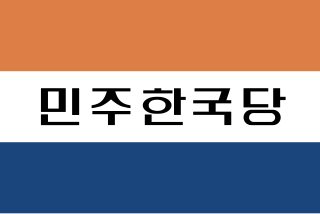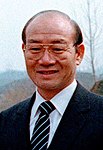An electoral college is a set of electors who are selected to elect a candidate to particular offices. Often these represent different organizations, political parties or entities, with each organization, political party or entity represented by a particular number of electors or with votes weighted in a particular way.

Kim Dae-jung, often referred to by his initials DJ, was a South Korean politician and activist who served as the 8th president of South Korea from 1998 to 2003.

The fourth Republic of Korea (Korean: 제4공화국) was the government of South Korea from November 1972 to March 1981.

The fifth Republic of South Korea was the government of South Korea from March 1981 to December 1987.

The Democratic Justice Party was the ruling party of South Korea from 1981 to 1988.

Presidential elections were held in South Korea on 19 December 2007. The election was won by Lee Myung-bak of the Grand National Party, returning conservatives to the Blue House for the first time in ten years. Lee defeated Grand Unified Democratic New Party nominee Chung Dong-young and independent Lee Hoi-chang by a nearly 2-to-1 margin, the largest since direct elections were reintroduced in 1987. It also marked the first time a president-elect in Korea was under investigation by a prosecutor. Voter turnout was 63.0%, an all-time low according to the National Election Commission.

Legislative elections were held in South Korea on 26 April 1988. The result was a victory for the ruling Democratic Justice Party (DJP), which won 125 of the 299 seats in the National Assembly. Voter turnout was 75.8%. This was the first time the ruling party did not win a majority in the National Assembly since the first legislative elections in 1950. In January 1990, the DJP merged with other two opposition parties, leaving the Kim Dae-jung-led Peace Democratic Party to be the sole opposition party.

Legislative elections were held in South Korea on 12 February 1985. The result was a victory for the Democratic Justice Party, which won 148 of the 276 seats in the National Assembly. Voter turnout was 84.6%.

Presidential elections were held in South Korea on 16 December 1987. They marked the establishment of the Sixth Republic, as well as the end of the authoritarian rule that had prevailed in the country for all but one year since its founding in 1948. They were the first direct presidential elections since 1971. For the previous 15 years, presidents had been indirectly elected by the National Conference for Unification, an electoral college dominated by the governing party.

The election of the president and the vice president of the United States is an indirect election in which citizens of the United States who are registered to vote in one of the fifty U.S. states or in Washington, D.C., cast ballots not directly for those offices, but instead for members of the Electoral College. These electors then cast direct votes, known as electoral votes, for president, and for vice president. The candidate who receives an absolute majority of electoral votes is then elected to that office. If no candidate receives an absolute majority of the votes for president, the House of Representatives elects the president; likewise if no one receives an absolute majority of the votes for vice president, then the Senate elects the vice president.

Indirect presidential elections were held in South Korea on 27 August 1980 to fill the vacancy caused by President Choi Kyu-hah's resignation.

Presidential elections were held in South Korea on 19 December 2012. They were the sixth presidential elections since democratization and the establishment of the Sixth Republic, and were held under a first-past-the-post system, in which there was a single round of voting and the candidate receiving the highest number of votes was elected. Under the South Korean constitution, a president is restricted to a single five-year term in office. The term of the then incumbent president Lee Myung-bak ended on 24 February 2013. According to the Korea Times, 30.7 million people voted with turnout at 75.8%. Park Geun-hye of the Saenuri party was elected the first female South Korean president with 51.6% of the vote opposed to 48.0% for her opponent Moon Jae-in. Park's share of the vote was the highest won by any candidate since the beginning of free and fair direct elections in 1987 and the first such election in which any candidate won a majority. Moreover, as of the 2022 election, this is the latest South Korean presidential election in which the winning candidate won an absolute majority of the vote.

Kim Young-sam, often referred to by his initials YS, was a South Korean politician and activist who served as the 7th president of South Korea from 1993 to 1998.

Chun Doo-hwan was a South Korean army general and military dictator who ruled as an unelected strongman from 1979 to 1980 before replacing Choi Kyu-hah as president of South Korea from 1980 to 1988.
Events from the year 1985 in South Korea.

The Democratic Korea Party was a political party in South Korea.
Hong Sook-ja is a South Korean activist, politician, and writer. She was appointed South Korea's first female diplomat and later became the first female presidential candidate to enter the electoral foray, having done so in South Korea's first democratic elections in 1987.

The Reunification Democratic Party was a political party of South Korea from 1987 to 1990. The party was established in April 1987 by Kim Dae-jung and Kim Young-sam, splitting from the New Korean Democratic Party. The party faced another split later that year with Kim Dae-jung and his followers organizing Peace Democratic Party. The party later merged with conservative Democratic Justice Party and New Democratic Republican Party in January 1990. The party members who opposed the merger formed the Democratic Party. The party had strong support in the Southeastern region of the country, including the South Gyeongsang Province and the city of Busan.

The New Democratic Republican Party was a South Korean conservative political party which formed in 1987 and dissolved in 1990. It was particularly strong in Hoseo, the home region of party leader Kim Jong-pil. However, it merged with two other parties in 1990 to form the Democratic Liberal Party.

The National Conference for Unification (Korean: 통일주체국민회의) was an organization of indirect democracy established in accordance with the Constitution when the 4th Republic was launched with the Yushin Constitution on October 17, 1972. The most important function was to promote independent peaceful reunification policies, which were the core of the Yushin Constitution, and indirect presidential elections during the 4th Republic From August 1973, the NCU was decided as National Assembly. The National Assembly was composed of delegates directly elected by the people from each district across the country, and the delegates of the National Assembly for Unification were unofficially called Tongdae.


















